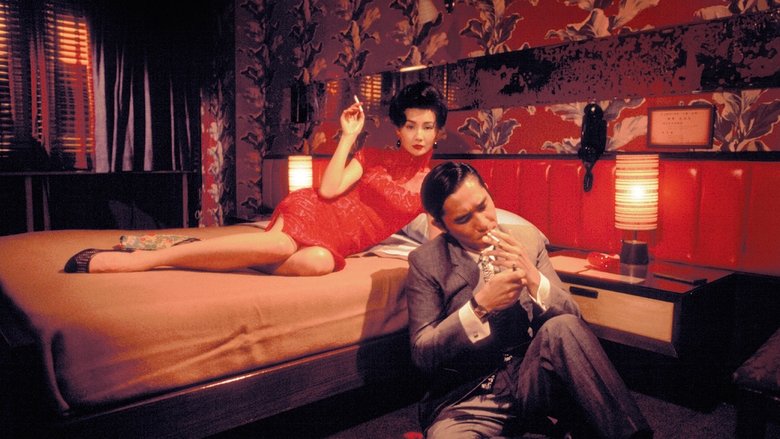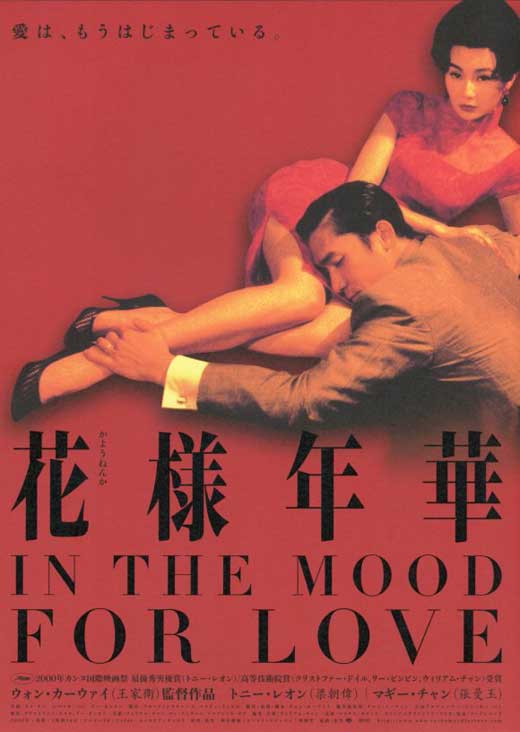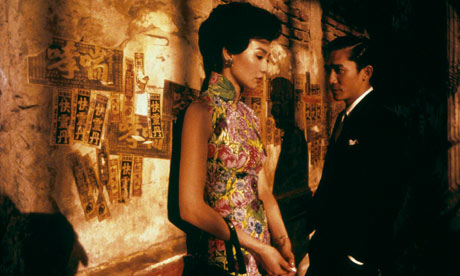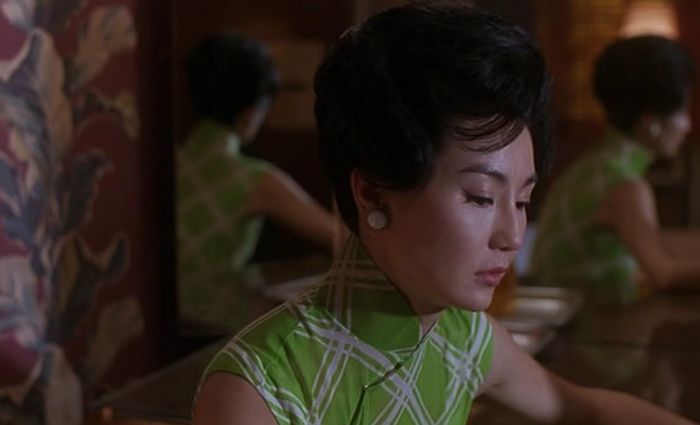← Back to Reviews

in
This'll be the last of my "nostalgia" reviews as it were. I'll be returning to my watch list and going through all of the films you all so generously recommended to me, and I'll take the opportunity to thank you all again for them all! However, tonight, I'm going to review Wong Kar-Wai's In the Mood For Love.


The plot follows Su Li-Zhen (Maggie Cheung) and Chow Mo-Wan (Tony Leung) a pair of lonely, isolated, and neglected individuals who both suspect that their spouses are cheating on them. After a series of small encounters, they realise their spouses are actually cheating on them with one another. Slowly, but most definitely surely, the two begin to fall in love with each other, but decide to keep their relationship platonic, to avoid stooping to the level of their spouses, with tragic consequences.
Positives
The acting was marvellous, and therefore heartbreaking. The leads, Maggie Cheung and Tony Leung, deliver subtle performances that are perhaps the most impacting, authentic, and completely persuasive performances I have ever witnessed. Their acting was consistent, and was absolutely superb throughout, I can't emphasise this enough! The chemistry the two of them shared was electric, and it was strikingly clear that they were totally entranced by one another. The awkward glances they trade, the extended stares they give one another, the small pinches of the arm they use in order to cope with the impending loss of their soul mate, every movement and every touch screamed how these two people wanted nothing more to experience happiness and bliss by being with one another permanently. Honestly, this is the most believable on screen romance I've seen due to the capabilities to these tremendous actors.
Tony Leung was even awarded with a Palme D'or, one of the very few awards in the acting industry that is perhaps as prestigious and more difficult to obtain than an Academy Award, and he thoroughly deserved it. Nevertheless, I preferred Maggie Cheung, her facial expressions magnificently portrayed precisely how her character was feeling, and her rapidly quick transitions from throwing a fake fašade of happiness into her true, devastated self, was so surreal, and every award that did not go to her in 2000 and 2001 were robbed.
One other member of the cast I'd certainly praise as well is Rebecca Pan, who plays Mrs.Suen, the landlady. Her scolding of Maggie Cheung for allowing her husband to forever stay away, but also because of her friendship with Tony Leung's character, something that was infrequent and not looked well upon at all during the 1960s within Hong Kong, created one of the most shocking and unexpected moments of the film, due to the brutality of her words and looks.
Moving onto the soundtrack, it was mesmerising and so intriguing, it made all of the scenes it was paired with extremely poignant and so prominent. It manages to emphasise the pain, depression, loneliness and love each character possesses to such an intense degree. It made for a surreal viewing experience that I won't be forgetting for quite some time.
I don't often comment on this, but in this film, it'd be a crime not to mention the costumes! Maggie Cheung's dresses were gorgeous (like the ones below) and were the most luminous and fluorescent object that the film managed to capture, and it isn't hard to understand why Tony Leung fell in love with her. William Chang (the costume designer) was also robbed of several awards for his brilliant contribution to this film, that has perhaps never been so intelligently used within film.


The direction was masterful. This is the only film by this acclaimed director that I have seen, but I will certainly have to check out his other works, because without a doubt, this is the most artistic and beautiful piece of cinematic bliss that I've had the pleasure of viewing. In addition, I liked how the spouses of Ms.Cheung and Mr.Leung always had their faces obscured, perhaps so that they were only designed to be a microcosm of these type of situations, or to emphasise how disillusioned the two of them have become to their spouses, and how they can't even recognise them or how they fell in love with them any more. But no matter of its true intention, it was a peculiar but wonderful touch to the film.
Some of the plot points were terrific too. They're so simple, but so inventive. For example, Su and Chow envision and enact confronting their spouses about their infidelity, which was quite an unusual element, but a fascinating one too. They also act out situations such as the last time they meet, as Su can't gather the courage to leave her husband, and these scenes were the most heart breaking. I rarely ever cry when watching films, but when Maggie Cheung breaks down in the street when Leung pretends to leave her, it left me sobbing, for watching such a beautiful and wonderful person be so devastated and despaired was extremely difficult to watch. The final scene was amazing too, and you can definitely see how it inspired Sofia Coppola in a much more iconic scene.
Negatives
I had to re-watch the last twenty minutes or so a couple of times so I could work out what had actually happened. Wong was rushed to produce a finished cut of the film in time for Cannes, which possibly explains why it's quite vague, and in all honesty, this is me probably being thick, so you probably won't encounter such an issue and difficulty should you watch this.
Conclusion
Every last element of this film was handled perfectly, and I can honestly say that this is the greatest film I have ever seen, regardless of location or genre. It was masterful, and a beautiful piece of cinema that I would classify as a piece of art.


The plot follows Su Li-Zhen (Maggie Cheung) and Chow Mo-Wan (Tony Leung) a pair of lonely, isolated, and neglected individuals who both suspect that their spouses are cheating on them. After a series of small encounters, they realise their spouses are actually cheating on them with one another. Slowly, but most definitely surely, the two begin to fall in love with each other, but decide to keep their relationship platonic, to avoid stooping to the level of their spouses, with tragic consequences.
Positives
The acting was marvellous, and therefore heartbreaking. The leads, Maggie Cheung and Tony Leung, deliver subtle performances that are perhaps the most impacting, authentic, and completely persuasive performances I have ever witnessed. Their acting was consistent, and was absolutely superb throughout, I can't emphasise this enough! The chemistry the two of them shared was electric, and it was strikingly clear that they were totally entranced by one another. The awkward glances they trade, the extended stares they give one another, the small pinches of the arm they use in order to cope with the impending loss of their soul mate, every movement and every touch screamed how these two people wanted nothing more to experience happiness and bliss by being with one another permanently. Honestly, this is the most believable on screen romance I've seen due to the capabilities to these tremendous actors.
Tony Leung was even awarded with a Palme D'or, one of the very few awards in the acting industry that is perhaps as prestigious and more difficult to obtain than an Academy Award, and he thoroughly deserved it. Nevertheless, I preferred Maggie Cheung, her facial expressions magnificently portrayed precisely how her character was feeling, and her rapidly quick transitions from throwing a fake fašade of happiness into her true, devastated self, was so surreal, and every award that did not go to her in 2000 and 2001 were robbed.
One other member of the cast I'd certainly praise as well is Rebecca Pan, who plays Mrs.Suen, the landlady. Her scolding of Maggie Cheung for allowing her husband to forever stay away, but also because of her friendship with Tony Leung's character, something that was infrequent and not looked well upon at all during the 1960s within Hong Kong, created one of the most shocking and unexpected moments of the film, due to the brutality of her words and looks.
Moving onto the soundtrack, it was mesmerising and so intriguing, it made all of the scenes it was paired with extremely poignant and so prominent. It manages to emphasise the pain, depression, loneliness and love each character possesses to such an intense degree. It made for a surreal viewing experience that I won't be forgetting for quite some time.
I don't often comment on this, but in this film, it'd be a crime not to mention the costumes! Maggie Cheung's dresses were gorgeous (like the ones below) and were the most luminous and fluorescent object that the film managed to capture, and it isn't hard to understand why Tony Leung fell in love with her. William Chang (the costume designer) was also robbed of several awards for his brilliant contribution to this film, that has perhaps never been so intelligently used within film.


The direction was masterful. This is the only film by this acclaimed director that I have seen, but I will certainly have to check out his other works, because without a doubt, this is the most artistic and beautiful piece of cinematic bliss that I've had the pleasure of viewing. In addition, I liked how the spouses of Ms.Cheung and Mr.Leung always had their faces obscured, perhaps so that they were only designed to be a microcosm of these type of situations, or to emphasise how disillusioned the two of them have become to their spouses, and how they can't even recognise them or how they fell in love with them any more. But no matter of its true intention, it was a peculiar but wonderful touch to the film.
Some of the plot points were terrific too. They're so simple, but so inventive. For example, Su and Chow envision and enact confronting their spouses about their infidelity, which was quite an unusual element, but a fascinating one too. They also act out situations such as the last time they meet, as Su can't gather the courage to leave her husband, and these scenes were the most heart breaking. I rarely ever cry when watching films, but when Maggie Cheung breaks down in the street when Leung pretends to leave her, it left me sobbing, for watching such a beautiful and wonderful person be so devastated and despaired was extremely difficult to watch. The final scene was amazing too, and you can definitely see how it inspired Sofia Coppola in a much more iconic scene.
Negatives
I had to re-watch the last twenty minutes or so a couple of times so I could work out what had actually happened. Wong was rushed to produce a finished cut of the film in time for Cannes, which possibly explains why it's quite vague, and in all honesty, this is me probably being thick, so you probably won't encounter such an issue and difficulty should you watch this.
Conclusion
Every last element of this film was handled perfectly, and I can honestly say that this is the greatest film I have ever seen, regardless of location or genre. It was masterful, and a beautiful piece of cinema that I would classify as a piece of art.
